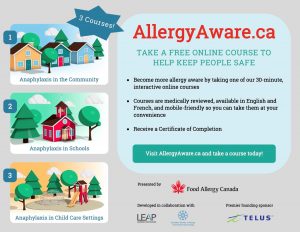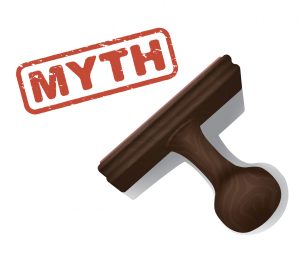A recent study reveals one-third of anaphylactic emergencies in kids occur under adult supervision. Learn more about the study and what you can do to change this statistic!
Plus, check out our new mythbuster series. This month we ask the question: Can only the top priority allergens cause life-threatening reactions?
Study reveals one-third of anaphylactic emergencies in kids occur under adult supervision.

Dr. Ben-Shoshan, senior author of the study
At least a third of reactions in children with food-induced anaphylaxis to a known allergen occur under adult supervision, according to a new study led by AllerGen researchers.
Published late last year, this study found that inadvertent exposures to a known food allergen in children are frequent, and in the majority of supervised reactions, adults were caregivers rather than a parent. The study also highlighted that many of the caregivers ignored the “may contain” label when giving food to children with food allergies.
This  study reinforces the need for education and awareness among adults who supervise children with food allergies. Our free AllergyAware.ca courses are an easy and interactive way to increase knowledge about food allergies. Take a course today and share with others who may be looking after your child.
study reinforces the need for education and awareness among adults who supervise children with food allergies. Our free AllergyAware.ca courses are an easy and interactive way to increase knowledge about food allergies. Take a course today and share with others who may be looking after your child.
Read AllerGen’s full press release on the study and an Allergic Living article that provides further insight.
New mythbuster series: check out this month’s edition
 Mythbuster: Can only the top priority allergens (like peanuts, treenuts, milk, sesame, and soy for example) cause life-threatening reactions?
Mythbuster: Can only the top priority allergens (like peanuts, treenuts, milk, sesame, and soy for example) cause life-threatening reactions?
No. While it’s true that the top priority food allergens in Canada are responsible for triggering most food-induced allergic reactions, in fact, any food can trigger an allergic reaction.
For example, it’s possible to be allergic to certain fruits and vegetables, or to spices such as garlic and cinnamon. In other words, when it comes to food allergies, it’s important to never assume that only one of the top allergens can trigger a reaction.
As always, when in doubt about what you or someone you care about is allergic to, seek the expertise of an allergist.
Read our other myths and facts on our blog.
- Desensitization Myths
- Myth: Ranking allergens
- Safety of EpiPens
- “Benadryl” Myth
- “Too young for epinephrine?”
- Myth: “Cooking out the allergen”
- Food allergy “cures”
- The right age for testing
Medical content reviewed by: Dr. Julia Upton, MD, FRCP(C) Clinical Immunology and Allergy
Tags: anaphylaxis in kids, mythbuster, myths, priority allergens, Research, study
